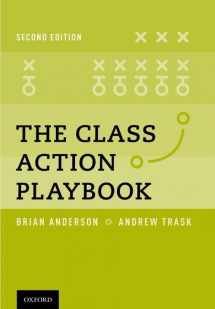
The Class Action Playbook
ISBN-13:
9780199933785
ISBN-10:
0199933782
Edition:
2
Author:
Andrew Trask, Brian Anderson
Publication date:
2012
Publisher:
Oxford University Press
Format:
Paperback
352 pages
Category:
Civil Procedure
,
Rules & Procedures
,
Litigation
FREE US shipping
Book details
ISBN-13:
9780199933785
ISBN-10:
0199933782
Edition:
2
Author:
Andrew Trask, Brian Anderson
Publication date:
2012
Publisher:
Oxford University Press
Format:
Paperback
352 pages
Category:
Civil Procedure
,
Rules & Procedures
,
Litigation
Summary
The Class Action Playbook (ISBN-13: 9780199933785 and ISBN-10: 0199933782), written by authors
Andrew Trask, Brian Anderson, was published by Oxford University Press in 2012.
With an overall rating of 3.7 stars, it's a notable title among other
Civil Procedure
(Rules & Procedures, Litigation) books. You can easily purchase or rent The Class Action Playbook (Paperback) from BooksRun,
along with many other new and used
Civil Procedure
books
and textbooks.
And, if you're looking to sell your copy, our current buyback offer is $0.35.
Description
The Class Action Playbook is a unique and strategic "how to" guide for practitioners seeking to bring or defend a class action. Every important issue is addressed, including the initial shape of the proposed action, choice of forum, case-management schedules, pre-certification discovery and motions activity, briefing and argument of the class-certification motion, class notice, preparation for trial, class settlements, and the binding effects of class action judgments.
Experienced practitioners Brian Anderson and Andrew Trask analyze what decisions the plaintiff and defendant must make at each stage of a proposed class action, and the considerations that might drive different strategies at each stage. The authors explain the importance of every issue, the choices available to each side, and the factors each side should consider in choosing the best path to follow.
This Second Edition covers six relevant cases from the historic 2010 and 2011 Supreme Court terms; official commentary on class actions with citations to the new American Law Institute's statement of the Principles of Aggregated Litigation, and where it upholds plaintiffs' or defendants' arguments; a discussion on emerging class action litigation tactics, including the use of arbitration clauses and the use of motions to strike class allegations; new appellate-court trends in class-action law, including developments in adequacy of representation, superiority, and use of experts at class certification.
Experienced practitioners Brian Anderson and Andrew Trask analyze what decisions the plaintiff and defendant must make at each stage of a proposed class action, and the considerations that might drive different strategies at each stage. The authors explain the importance of every issue, the choices available to each side, and the factors each side should consider in choosing the best path to follow.
This Second Edition covers six relevant cases from the historic 2010 and 2011 Supreme Court terms; official commentary on class actions with citations to the new American Law Institute's statement of the Principles of Aggregated Litigation, and where it upholds plaintiffs' or defendants' arguments; a discussion on emerging class action litigation tactics, including the use of arbitration clauses and the use of motions to strike class allegations; new appellate-court trends in class-action law, including developments in adequacy of representation, superiority, and use of experts at class certification.


We would LOVE it if you could help us and other readers by reviewing the book
Book review

Congratulations! We have received your book review.
{user}
{createdAt}
by {truncated_author}


